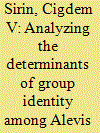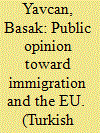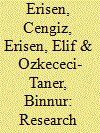|
|
|
Sort Order |
|
|
|
Items / Page
|
|
|
|
|
|
|
| Srl | Item |
| 1 |
ID:
120749


|
|
|
|
|
| Publication |
2013.
|
| Summary/Abstract |
This study systematically explores the factors that affect collective identity associations within the Alevi community in Turkey by employing the social identity approach and examining survey data collected through fieldwork. The results show that Kurdish Alevis express lower levels of attachment to their religious identity as compared to Turkish Alevis. The results also indicate that personal experiences of discrimination tend to increase one's prioritization of Alevi identity. Last, no significant differences are observed regarding group identity between Alevis who reside in urban areas and those who live in rural areas.
|
|
|
|
|
|
|
|
|
|
|
|
|
|
|
|
| 2 |
ID:
120751


|
|
|
|
|
| Publication |
2013.
|
| Summary/Abstract |
This article provides an experimental analysis of the role emotions play in Turkish voters' political attitudes and behavior with respect to the Syria crisis. By examining the political effects of emotions, this article contributes to the discussion on Turkish voters' political attitudes and political behavior. Through an experimental design, this study shows how incidentally raised emotions on the Syria issue can influence individual attitudes on foreign policy, interest in seeking more information about the issue, and evaluations of Turkish Prime Minister Recep Tayyip Erdogan's performance. This article aims to stimulate further research in the literature on the potential effects of emotions in Turkish political behavior.
|
|
|
|
|
|
|
|
|
|
|
|
|
|
|
|
| 3 |
ID:
120750


|
|
|
|
|
| Publication |
2013.
|
| Summary/Abstract |
As political trust literature has focused on its political and economical determinants, the linkage between ethnicity and trust in domestic and international institutions has been largely overlooked with a few notable exceptions. This study aims to underline this linkage and offer several hypotheses to test them in Turkish context. Using the European Social Survey conducted in 2008, this study finds that, though Kurds have low levels of trust in domestic institutions, their distrust is not uniform across all institutions. Second, it finds that Kurds are pro-international institutions; that is, compared to Turks, they hold higher trust in international institutions. Finally, it finds that, contrary to the studies on the winner/loser debate in long-standing democracies, winners in general and Kurdish winners, those who voted for the Justice and Development Party, the winning party in the 2007 election-are not distinguishable in their level of trust in political institutions from the rest of society.
|
|
|
|
|
|
|
|
|
|
|
|
|
|
|
|
| 4 |
ID:
120748


|
|
|
|
|
| Publication |
2013.
|
| Summary/Abstract |
The relative impacts of social influence and political party affiliation on electoral choices depend on the maturity of the political party system. In established democracies political party affiliation has a decisive impact on electoral choices whereas in democratizing countries political discussion influences over-time volatility in electoral outcomes. This paper investigates the significance of both factors on individual attitudes toward political candidates in Turkey. Findings from an experiment where social disagreement and candidate political party affiliation are manipulated indicate that young voters are sensitive to both partisan cues and socially supplied disagreement in forming and changing their attitudes toward political candidates. The results also show that, unlike most developing countries with weak parties, party label in Turkey is an important heuristic for making electoral choices. However, social disagreement can make political attitudes unstable. The findings suggest that Turkey presents us with a case in between the developed country voters' iron clad partisan attachment and the developing country voters' high susceptibility to socially communicated persuasive messages.
|
|
|
|
|
|
|
|
|
|
|
|
|
|
|
|
| 5 |
ID:
120752


|
|
|
|
|
| Publication |
2013.
|
| Summary/Abstract |
Leaders are influential in Turkish politics; since early Republican years under Atatürk and Inönü, the dominance of omnipotent leaders continued, if not escalated, under democratic elections. Menderes or Demirel or Erbakan, and presently Erdogan, each leader assumed office with different personal and political backgrounds, worldviews, and personality characteristics. Nonetheless, a systematic study of political leaders in Turkish politics and foreign policy has rarely been a concern to scholars of Turkey. This lack of attention to Turkey's political leaders affects not only a nuanced understanding of its domestic politics but also its foreign policy. How do Turkish leaders' idiosyncratic traits affect their politics? How does the common phrase "secular and religious leaders" capture differences among Turkey's leadership? Utilizing a method of leadership assessment at-a-distance, this piece provides answers to such questions with respect to foreign policy profiles of all post-Cold War prime ministers of Turkey. It illustrates that Turkish leaders have distinct leadership traits but cannot be reduced to "seculars" and "Islamists."
|
|
|
|
|
|
|
|
|
|
|
|
|
|
|
|
| 6 |
ID:
120753


|
|
|
|
|
| Publication |
2013.
|
| Summary/Abstract |
Public preferences on immigration and attitudes toward the European Union (EU) have been shown to be closely related. In this article, it is argued that, to better understand this relationship, people's opposition to immigration should be differentiated based on the ethnicity of the prospective immigrant group. Specifically, in the case of Germany, Turkish immigrants constitute a special case. The results of the original survey experiment conducted in Germany suggest that, controlling for other explanations, categorizing immigration attitudes by ethnic group reveals that fear of EU enlargement and future Turkish immigration is actually a more important reason for Euroskepticism than has been shown so far. That is, people's opposition to immigrants from Turkey explains their overall Euroskepticism much better than their attitudes toward immigrants from within EU member states, suggesting that their attitudes are informed by opposition to further enlargement rather than a general dislike of multiculturalism.
|
|
|
|
|
|
|
|
|
|
|
|
|
|
|
|
| 7 |
ID:
120746


|
|
|
|
|
| Publication |
2013.
|
| Summary/Abstract |
Given the interdisciplinary nature of political psychology research, the methods employed to produce scientific knowledge should be able to answer the questions raised in the discipline. The multitude of methods used in political psychology offers a variety of options for those interested in conducting research in political science. This article explains the basic structure of experimental design, survey research, and content analysis and briefly discusses the recent developments and interest growing on certain methods in the discipline. Each method is discussed in detail to the extent that would be sufficient to understand what one could achieve by using it.
|
|
|
|
|
|
|
|
|
|
|
|
|
|
|
|
| 8 |
ID:
120747


|
|
|
|
|
| Publication |
2013.
|
| Summary/Abstract |
This paper investigates the individual level factors that influence support for social redistribution and social policy in Turkey by focusing on the role of core values and religiosity. The analysis of data from Round 4 of European Social Surveys shows that self-transcendence and conservation values enhance support for government provision of social safety nets. Different aspects of religiosity have different effects on attitudes toward redistribution and social policy, with self-identified religiosity having a positive and social religious behavior having a negative effect on support for government responsibility in providing social insurance.
|
|
|
|
|
|
|
|
|
|
|
|
|
|
|
|
|
|
|
|
|